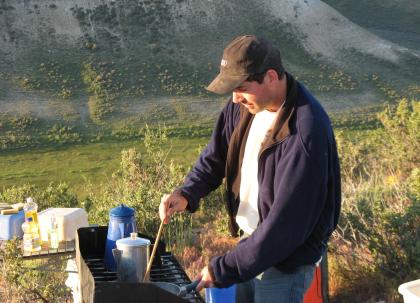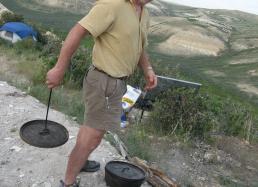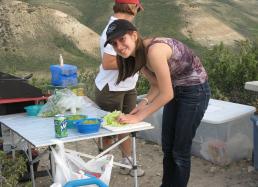3: Food for Nourishment; Food for Thought
Today is the end of a long, hard day of digging through heavy rock, we've yet to get to the prime fossil level, and I'm feeling more than a bit hungry tonight. Therefore, I'll focus on another critical part of fieldwork: food. One of the most important things for field expeditions, especially ones that are physically difficult, is food. When people work very hard, they work up an appetite, and part of keeping a field crew happy is to feed them well. And we definitely need to keep the field crew happy!
Jim Holstein is a terrific organizer of cooking and dishwashing arrangements (among other things), and he works out a plan each year so that everyone takes a turn at cooking and washing, although he retains oversight on the menus and is the head camp chef. So far, over the years it has worked out well: we've had no shortage of camp delicacies, and no one has mutinied because of bad food.
We have two meals in camp each day (breakfast and dinner), and we eat a simple lunch in town when we go in to fill up on water and supplies. Breakfast is generally only coffee, fruit, and cereal, but camp dinners can be quite elaborate. And eating outside after a hard day's work makes the food taste all the better. Over the last couple of nights, we've had chicken Alfredo, broccoli, steak, stir fry over rice, and strawberry rhubarb pie, all made from scratch. (Mike Eklund's Dutch oven for desserts is made to work in the campfire coals.) After dark, the students like to make s'mores around the campfire. It's all good.
Eating lunch in town can be challenging. Kemmerer is a quiet town of about 2,900 people (one of the largest towns in southwestern Wyoming, believe it or not), and unlike many larger towns like Chicago, some of the current Kemmerer restaurants do not always appreciate a lot of extra business. (One year, a local restaurant switched the "open" sign to "closed" when they saw us coming—not this trip, though.) So we usually have a picnic lunch in the park with food purchased at the Jubilee grocery store. Fresh produce, fruit, and cheese take the taste of dust out of everyone's mouth for about an hour.
We're going green this year, and so instead of paper plates, plastic flatware, and paper cups, we issued a mess kit to each member of the crew. The Field Museum is becoming more and more concerned about environmental conservation, so we're trying to be mindful even of the little things—and the amount of paper plates and cups a crew of 30 can use over the course of the field season adds up to more than a little.
That's it for today. The mosquitoes are moving in, and I need to go grab a long-sleeved shirt. I'll report in again soon.
Lance






